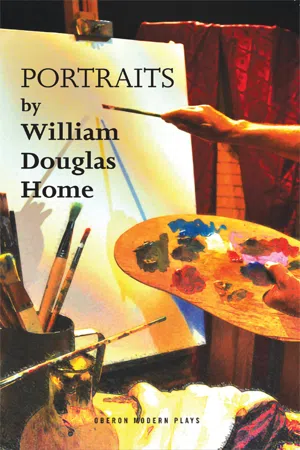![]()
ACT I
SCENE I
A studio in Tite Street, Chelsea, London. Spring, 1944.
When the CURTAIN rises MONTGOMERY, wearing his well-known beret with two badges, is moving round, inspecting the contents of the studio — the pictures on the walls and on the floor, the furniture. The young Guards’ COLONEL stands there watching him.
MONTY: (Halting in his promenade, addressing the Colonel.) How much longer is this fellow going to keep us waiting?
COLONEL: He’ll be here any moment, sir, I’m sure.
MONTY: What time was the appointment made for?
COLONEL: Ten fifteen, sir.
MONTY: (Looking at his watch.) Well, it’s ten sixteen now. (He resumes his pacing. He picks up a dirty glass and puts it down and then runs a finger down a piece of furniture and notes the dust thereon. Holding up his dirty finger.) Look at that! He’s late, he’s dirty and he drinks. And there are women in it somewhere.
COLONEL: You’re dead on target, sir, as usual.
MONTY: What’s the name again?
COLONEL: John, sir.
MONTY: John what?
COLONEL: John nothing, sir. His name’s Augustus John. And John’s the surname.
MONTY: There’s a fellow in the Navy called John, with a fancy name.
COLONEL: That’s right, sir. Caspar. He’s his son.
MONTY: Poor fellow. He’s a captain, isn’t he?
COLONEL: That’s right, sir.
MONTY: I don’t know which this room smells of worst, drink or tobacco.
COLONEL: He’s a first-class artist, sir. He got the OM for it recently.
MONTY: I can’t see why.
COLONEL: Well, look at that, sir. (He points at a picture on the wall of the studio.)
MONTY: I am looking at it.
COLONEL: Well, it’s good, sir, isn’t it?
MONTY: It’s not by him … Unless he signs himself Gwen!
COLONEL: Sorry my mistake, sir. That’s his sister.
MONTY: Was that her who let us in?
COLONEL: No, sir. She’s dead.
MONTY: Well, who’s the woman?
COLONEL: She’s Dorelia. She’s famous.
MONTY: What for?
COLONEL: Well, she’s been the model for a lot of his best pictures.
MONTY: Since when?
COLONEL: Since his wife died, sir, if not before.
MONTY: When did his wife die?
COLONEL: Years ago, sir. Quite a bit before the first war.
MONTY: Have you done a course on John or something?
COLONEL: No, sir. I was taught about him at school.
MONTY: He’s as good as that, then, is he?
COLONEL: Better, sir. He’s probably our greatest artist.
MONTY: That’s what the art master told you, is it?
COLONEL: Yes, sir.
MONTY: What else did he tell you?
COLONEL: That he broke his first wife’s heart.
MONTY: Is that authenticated?
COLONEL: Don’t ask me, sir. The art master said he was a womanizer and he always had been.
MONTY: What was she called?
COLONEL: Ida – Ida Nettleship.
MONTY: And what was she like?
COLONEL: The art master told us that she was the perfect wife for somebody who didn’t want one.
MONTY: Poor girl! Why did she die so young?
COLONEL: After childbirth, sir.
MONTY: (Jerking a thumb towards the door.) Then he picked up this woman?
COLONEL: He’d picked her up already, sir. According to the art master Dorelia and Ida and Augustus were great friends.
MONTY: A ménage à trois, you mean.
COLONEL: That’s a fairly modest estimate, I’d say, sir, when you take in all his other mistresses and models.
MONTY: Quite a harem, eh?
COLONEL: Oh, yes, sir, over the years.
MONTY: And you learned all this from the art master at school, did you?
COLONEL: Yes, sir.
MONTY: And you’ve not forgotten it?
COLONEL: No, sir.
MONTY: Why not?
COLONEL: Because I found it fascinating, sir.
MONTY: Why?
COLONEL: Why not, sir?
MONTY: Because you want to be an artist or because you want to be a lecher when this war is over?
COLONEL: I’d like to be an artist, sir.
MONTY: And not a lecher?
COLONEL: No, sir.
MONTY: Well, you may not find it easy. Artists live on the excuse that they must have a free hand or they can’t paint. And, from what I’ve seen of you I’d say you were a steady and straightforward fellow with a pretty wife and pretty little daughter. And from that I would deduce you wouldn’t want a free hand. So you’d better cut the artist out and stick to soldiering. And finish up a general like me! How would you like that?
COLONEL: Not much, sir.
MONTY: So you’d rather be an artist.
COLONEL: Yes, sir.
MONTY: You’d rather be Augustus John than me,...




